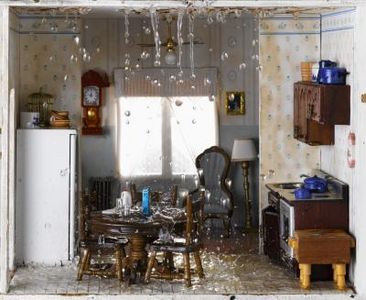Are my household appliances covered from water damage according to my home insurance?

Household appliances such as hot water heaters, dishwashers, AC units, and washing machines generally store a certain amount of water in them. In case of an appliance malfunction, this water may be released into your home. Old and rusty hot water heaters are generally the household appliances that become the cause of water damage in a home. Of course, if there is someone at home during this unfortunate time, steps can be taken to reverse any possible damage but in the event that no one is at home, chances are high that you will face pervasive and expensive water damage in your home.
If your household appliances have malfunctioned through no fault of your own and through general wear and tear, the most standard home insurance policies will cover the water damage caused as a result. However, if the appliance was knocked over or damaged in any other way, the water damage will not be covered.
Your standard home insurance policy will cover the water damage to your home but not the replacement cost of the appliance. For this, you will have to turn toward your home warranty company who may be able to help you depending on the home warranty policy.
Prevention is Better than any Clean Up
In the case of water damage, it is always advisable to take steps to prevent its occurrence all together instead of dealing with claims and the clean-up process.
- Location: While dishwashers and washing units are generally places in the laundry room and the kitchen for ease of use, appliances such as hot water heaters can be moved depending on your water lines. If your hot water heater is installed next to a room that has expensive items in it or expensive flooring and wall coverings, you might be better off asking a plumber to move the hot water heater into another room such as the basement or better yet, an outdoor utility closet. In case of a mishap, you will be better off with the appliance further away from damageable and expensive goods, belongings, and most basically, your floor.
- Maintenance: Timely maintenance will ensure that you know when you need to change your hot water heater and other household appliances. This will prevent malfunctions to a large extent. Inspect your appliances regularly for signs of rust or leakages so they can be repaired at the earliest sign of trouble. The best way to inspect appliances is by following the water line that extends from the back of the unit in question to the pipes and connectors. If you see signs of leakages or rust, call a licensed technician and/or business to tackle this problem before it ruins your day and puts a dent in your pocket book.
- Prepare for any eventuality: Sometimes prevention methods do not work. In such cases, it is important to be prepared for any eventuality. In case of a unit breakdown and subsequent water leakage, the first thing to do is to shut of the home's water line to limit the damage. To do this, you need to know the location of the main water valve of your home beforehand. Contain the spilling water in buckets and call to a plumber immediately.
For any water damage due to home appliances related queries, contact your home insurance agent.
